Table of Contents
 Coffee grounds are a popular organic material that many gardeners use as a soil amendment. They are rich in organic matter and can provide beneficial nutrients to plants. However, not all plants respond positively to the addition of coffee grounds. Understanding which plants may not appreciate coffee grounds is crucial for maintaining a thriving garden.
Coffee grounds are a popular organic material that many gardeners use as a soil amendment. They are rich in organic matter and can provide beneficial nutrients to plants. However, not all plants respond positively to the addition of coffee grounds. Understanding which plants may not appreciate coffee grounds is crucial for maintaining a thriving garden.
From succulents to blueberries and geraniums to asparagus, we will delve into specific plant preferences and the effects of coffee grounds on their growth. Additionally, we will discuss how coffee grounds can attract whiteflies, potentially causing issues for certain plants prone to infestations.
By recognizing which plants are not compatible with coffee grounds, gardeners can avoid potential pitfalls and optimize the health and productivity of their gardens. So, let’s explore the plants that may not appreciate the presence of coffee grounds and discover the best practices for using them effectively in your gardening endeavors.
This article will list plants that don’t like coffee and provide information about what happens when you use coffee grounds at home.
Which Plants Do Not Like Coffee Grounds? – Secrets Revealed
Coffee grounds are a common and unavoidable component of coffee brewing, but some plants may not appreciate their presence. Coffee grounds are very useful. Not only do they improve the smell and taste of the soil, but they also benefit fauna and flora. They can be applied to plant pots or cultivated directly in garden soil. However, not all plants will like you using the coffee ground as fertilizer.
Coffee grounds are the perfect addition to the garden. They’re filled with nutrients and can help improve your soil’s texture. They act as a natural insect-repulsive solution if you spread them around plants that tend to attract insects.
However, some plants don’t like coffee grounds and should be avoided when using them in the garden. If you’re unsure your plant is on this list, try it first. If it thrives, great! If not, remove the coffee grounds and try something else.
Why Coffee Grounds
Coffee grounds are toxic to plants. This may not be a secret to many coffee drinkers, but it’s an interesting tidbit of information for those who care about our plants. Coffee grounds can be quite destructive to plants if left on the soil’s surface. They can form a thick layer of organic matter that will suffocate the plant’s roots. Additionally, coffee grounds contain high acidity levels, which can damage plant cells. If you’re growing plants in containers, rinse the grounds before placing them in their new home.
List of Plants that do not like Coffee Grounds
Cacti and Succulents
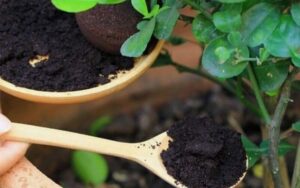
Cacti and succulents have very sensitive root systems and thrive best in sandy soil with little or no organic material added to them. The high nitrogen concentration in the coffee grounds will cause these plants’ roots to rot and die off quickly, leading to other problems such as root rot or stunted growth.
Tomatoes
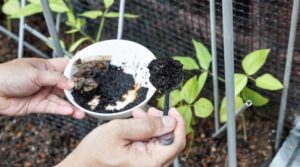
Tomatoes need a lot of nitrogen, and use it quickly, so adding coffee grounds will kill them if you use too much. It is better to add compost or aged manure instead of coffee grounds.
Fruit Trees
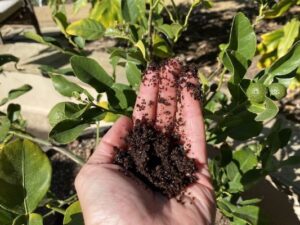
They need a lot of potassium, phosphorus, and calcium, but coffee grounds do not provide enough nutrients for fruit trees. It would be best to use compost or aged manure instead of coffee grounds when planting fruit trees.
Aloe Vera
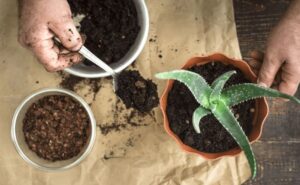
Pulpy plant and the Middle East. It’s been used as a medicine and an aid to skin care for centuries. Despite its popularity, aloe vera doesn’t like coffee grounds very much. When they’re brewed with coffee, the acidity of the grounds can cause damage to the plant’s cells.
Grapes

Grapes are a type of fruit that typically does not like coffee grounds. The acid in the coffee grounds can damage the skin and pulp. The coffee grounds can also contain caffeine, making it difficult for the grapes to absorb nutrients.
Blueberries
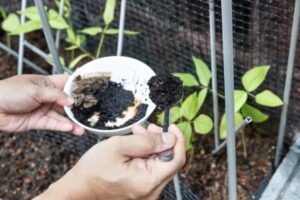
Coffee grounds can be a nuisance for plants as they can harm them by leaving behind a bitter residue. This is why many plants do not like coffee grounds, including blueberries.
Baby’s BreatBaby’ss well-drained soil and prefers partial shade, but coffee grounds can be problematic. The caffeine in coffee can disturb the plant’s root system.
Banana Plant
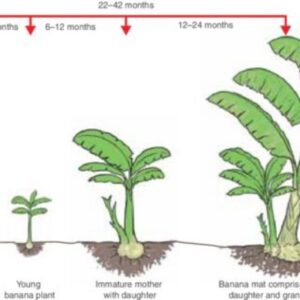
The banana plant does not like being disturbed and loves fertile soil with good drainage. Unfortunately, coffee grounds can cause the soil to become too boggy and slow the water plants.
Peace Lily
The Peace Lily likes moist soils with good drainage, but coffee grounds can make the soil too wet and cause rot. Avoid watering your peace lily on coffee grounds, as this will only worsen the situation.
Geraniums
Geraniums prefer slightly alkaline soil, and coffee grounds can increase the acidity, potentially affecting their growth.
Asparagus
Asparagus plants prefer neutral to slightly alkaline soil. The acidity of coffee grounds may not be suitable for them.
Whiteflies-Prone Plants
Coffee grounds can attract whiteflies, so plants susceptible to whitefly infestations, such as tomatoes, cucumbers, and peppers, may be negatively affected.
Plants Do Not Like Coffee Grounds
| Plants | Preference | Coffee Grounds Effect |
| Succulents | Well-draining soil | Coffee grounds can retain moisture, potentially causing root rot |
| Blueberries | Acidic soil | Coffee grounds are acidic, may make the soil too acidic |
| Geraniums | Slightly alkaline soil | Coffee grounds increase acidity, may affect growth |
| Asparagus | Neutral to slightly alkaline soil | Coffee grounds are acidic, may not be suitable |
| Whiteflies-Prone Plants (e.g., tomatoes, cucumbers, peppers) | Varies | Coffee grounds can attract whiteflies, potentially leading to infestations |
Plants That Like Coffee Grounds
| Plants | Preference | Coffee Grounds Effect |
| Roses | Well-draining soil, slightly acidic | Coffee grounds add organic matter and acidity |
| Azaleas | Acidic soil | Coffee grounds provide acidity and organic matter |
| Hydrangeas | Acidic soil for blue flowers, alkaline soil for pink flowers | Coffee grounds can influence soil pH for desired flower color |
| Rhododendrons | Acidic soil | Coffee grounds contribute acidity and organic matter |
| Camellias | Acidic soil | Coffee grounds add acidity and improve soil texture |
| Fiddle-leaf figs | Well-draining soil | Coffee grounds can improve soil structure and drainage |
| Carrots | Loose, well-drained soil | Coffee grounds can help improve soil structure |
| Tomatoes | Well-draining soil | Coffee grounds contribute organic matter and can deter pests |
Pros and Cons Of Using Coffee Grounds In Plants
| Pros | Cons |
| Coffee grounds are a rich source of organic matter, adding nutrients to the soil. | Coffee grounds are acidic and can potentially alter the pH of the soil. |
| They improve soil structure and drainage, especially in compacted or heavy soils. | Excessive use of coffee grounds can lead to a buildup of caffeine, which may negatively affect plant growth. |
| Coffee grounds can attract earthworms, which help aerate the soil and enhance nutrient availability. | Coffee grounds can retain moisture, potentially causing root rot if overused or in poorly draining soil. |
| They can act as a natural mulch, suppressing weed growth and conserving soil moisture. | Coffee grounds should be properly composted or mixed with other organic materials to avoid compacting the soil. |
| Some plants, like roses and acid-loving plants, benefit from the acidity provided by coffee grounds. | Improper application or excessive amounts of coffee grounds can create a crusty layer on the soil surface, inhibiting water infiltration. |
Final Words
This blog post lists plants that do not like coffee grounds as fertilizer. It also lists the pros and cons of using coffee grounds as fertilizer. Finally, it provides information on the best way to use coffee grounds as fertilizer.

